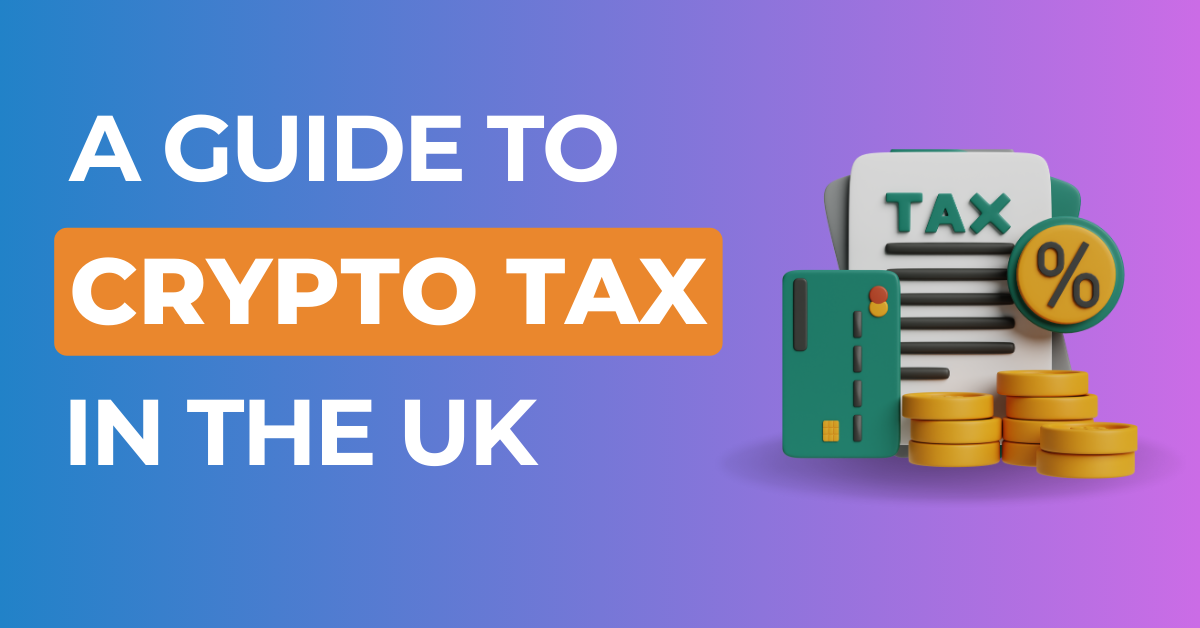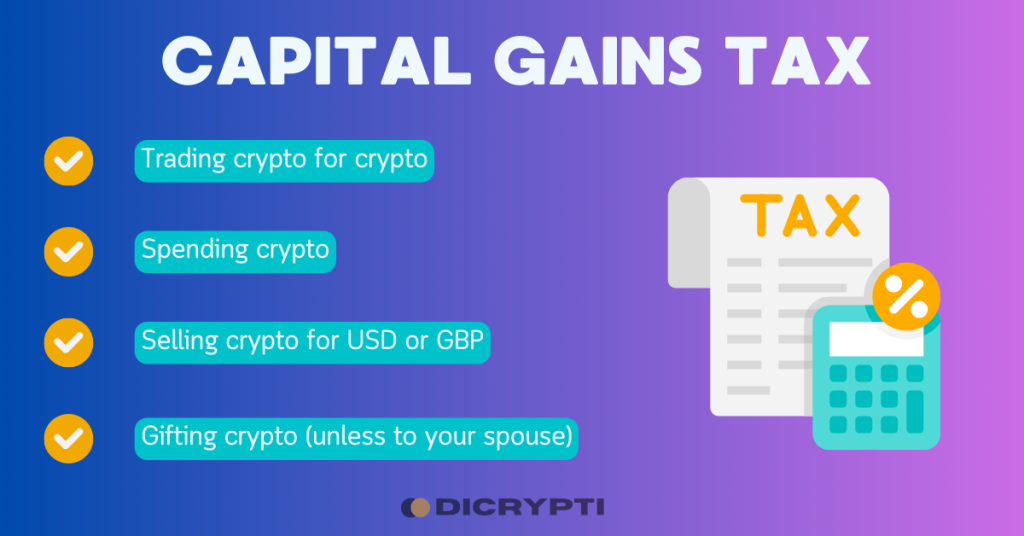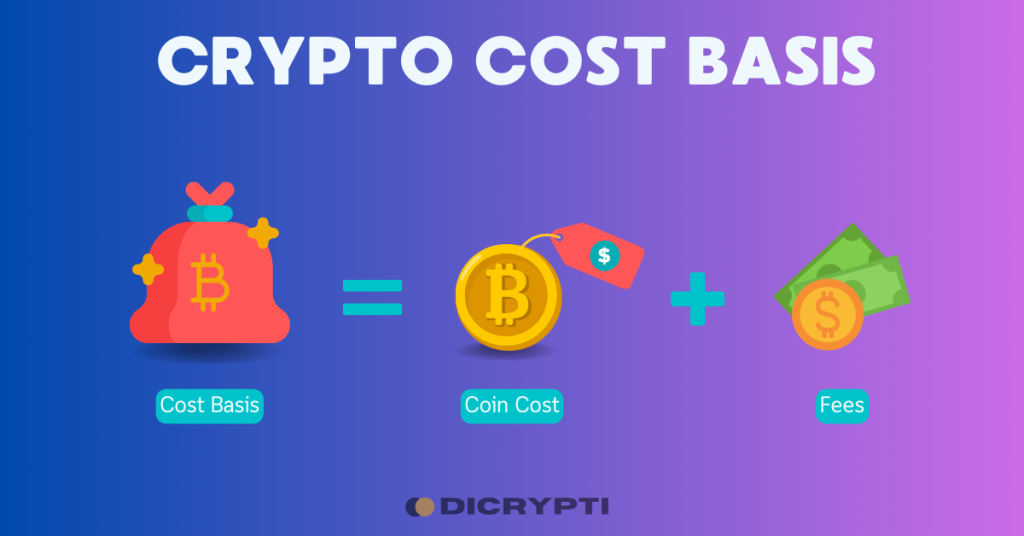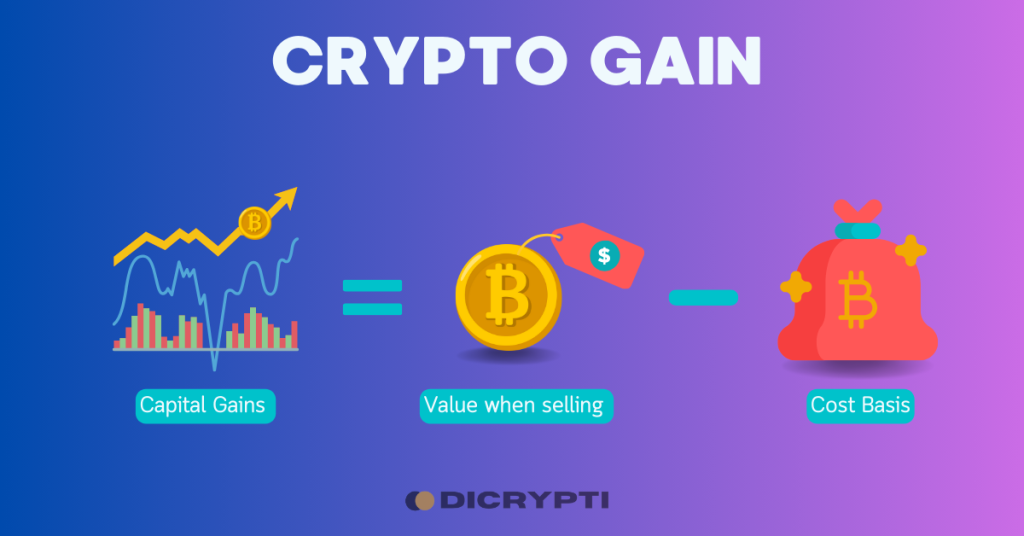Your basket is currently empty!

Cryptoassests and Tax in the UK (2024)
Cryptocurrency, once a niche and often misunderstood market, has undoubtedly paved its way into mainstream finance. As adoption grows, so does the need for clarity regarding its fiscal implications. For those in the United Kingdom, understanding cryptocurrency taxation isn’t just a matter of due diligence—it’s essential for staying compliant with HMRC’s regulations. Whether you’re an individual investing in Bitcoin or a business navigating the intricacies of DeFi, this guide aims to shed light on how the HMRC views your digital assets and what that means for your tax obligations. Let’s delve into the details of UK crypto taxation, equipping you with the knowledge to navigate these complex regulations confidently.
Cryptocurrency Taxation Overview
Navigating the world of cryptocurrencies in the UK isn’t just about trading wisely and understanding market trends; it’s also about getting a clear grasp of the tax landscape. One of the most common questions posed by crypto enthusiasts and investors alike is: “Are cryptocurrencies even taxable in the UK?” The answer, quite simply, is yes. The HMRC (Her Majesty’s Revenue and Customs) has made its stance clear on this matter. Cryptocurrencies, irrespective of their volatility and decentralized nature, are very much subject to taxation. However, how they’re taxed largely depends on the nature of your transactions.
Two primary taxes apply to cryptocurrencies in the UK:
Capital Gains Tax (CGT): This tax is levied on the profit made from selling or disposing of a cryptocurrency. If you’ve held onto a cryptocurrency and its value has appreciated over time, any profit you make when you sell it will be subject to CGT.
Income Tax: If you receive cryptocurrencies as a form of payment for services, or perhaps as earnings from mining operations or airdrops, this would be considered as income. Such earnings would be subject to the standard Income Tax rates. As we delve deeper into this guide, we’ll explore the nuances of each tax type, the rates, and the scenarios under which they apply. Remember, while cryptocurrencies operate in a decentralized environment, when it comes to taxes, centralized authorities like the HMRC have the final say.

Cost Basis Calculation
A foundational element of cryptocurrency taxation is understanding how to correctly determine the cost basis of your assets. This is crucial because your taxable gain or loss is derived from the difference between your selling price and this basis. Here’s how it works within the UK’s regulatory environment:
- Simply put, the cost basis of a cryptocurrency is the original value of the asset when it was acquired, including all associated costs like fees and commissions. It represents the ‘starting point’ from which gains or losses are calculated upon disposal.

Tax Rates for Cryptocurrency Gains
When dealing with cryptocurrencies in the UK, understanding the applicable tax rates is crucial for financial planning and compliance. Depending on your transactions, you might be liable for either Capital Gains Tax or Income Tax. Let’s explore each of these in detail:

Capital Gains Tax (CGT) Rates:
Capital gains from cryptocurrency transactions aren’t immediately taxable. There is an annual tax-free allowance, which, until recently, stood at £12,300. This means if your total capital gains in a year are below this threshold, you wouldn’t have to pay any tax. However, any gains exceeding this allowance are taxable. The rates are:
10% for individuals who are basic rate taxpayers (taking into account all taxable income).
20% for individuals whose income places them in the higher or additional rate tax brackets.
Income Tax on Cryptocurrency Earnings:
If you earn cryptocurrency, for instance, through mining, airdrops, or as payment for services, it’s considered income. The tax rates for this income depend on the taxpayer’s total earnings, including crypto and other sources:
Basic rate: 20% for incomes between the personal allowance threshold and £50,270.
Higher rate: 40% for incomes between £50,271 and £150,000.
Additional rate: 45% for incomes exceeding £150,000.
Key Updates for 2023:
One significant change that’s imperative to note is the recent amendment to the Capital Gains Tax allowance. Starting from April 2023, the government has reduced the tax-free allowance from £12,300 to £6,000. This reduction potentially brings more people into the tax net and can affect your liability considerably. Taxation may seem daunting, especially with fluctuating allowances and rates, but understanding these basic principles is the first step. As we proceed, we’ll touch on how to leverage certain provisions to potentially reduce your liability and ensure you remain compliant with HMRC regulations.
Capital Losses and Offsetting
One of the more intricate aspects of crypto taxation in the UK revolves around the concept of capital losses and how they can be used to offset potential tax liabilities. Let’s delve into the details:
Understanding Capital Losses:
A capital loss occurs when you sell a cryptocurrency for less than its acquisition cost. For instance, if you bought Bitcoin for £10,000 and sold it later for £8,000, you would incur a capital loss of £2,000. The HMRC permits taxpayers to offset capital losses against capital gains. So, if you had a capital gain of £5,000 from another crypto transaction and a capital loss of £2,000 from the above example, you could offset this loss, making your taxable gain £3,000. This provision can significantly reduce your tax liability, especially if you’ve had multiple transactions with varying degrees of profit and loss. If your capital losses in a particular year exceed your capital gains, you can carry forward the excess loss to offset against capital gains in future years. However, there’s a catch: You must report these losses to HMRC to carry them forward, even if you have no tax to pay that year.
Lost or Stolen Cryptocurrency:
A point of contention and often confusion among crypto investors is the treatment of lost or stolen cryptocurrencies. It’s essential to note that HMRC doesn’t regard the theft or loss of cryptocurrency as a ‘capital loss’. This means you can’t claim a reduction in tax because of crypto assets that got stolen or are irretrievable. However, each situation is unique. If you believe there are special circumstances surrounding your case, consider consulting a tax professional or the HMRC directly. Capital losses, when managed correctly, can serve as a useful tool in navigating your tax responsibilities. It underscores the importance of diligent record-keeping and timely reporting to ensure you’re maximizing your benefits while staying within the confines of the law.
Section 104 Rule:
In the realm of cryptocurrency taxation in the UK, the Section 104 holding rule is predominant. Under this method, all holdings of a particular cryptocurrency are grouped together, and the average cost is used to determine the cost basis. For instance, if you purchased Bitcoin on three separate occasions, each at different prices, you would average out the costs of these purchases to determine your cost basis when selling any portion of your Bitcoin holdings.
Tax Loss Harvesting:
While it might be tempting to try and leverage ‘tax loss harvesting’ (selling assets at a loss to reduce tax liability and then quickly repurchasing them), the HMRC has provisions against this. Specifically, the ’30-day rule’ states that if you repurchase the same asset within 30 days of the sale, the original and new assets are treated as one for tax purposes. Thus, it’s essential to tread carefully and avoid strategies that might be seen as trying to circumvent tax obligations.
Tax Breaks and Crypto Income Streams
Understanding the nuances of taxation surrounding crypto isn’t just about what you owe; it’s also about knowing the potential tax breaks and how different types of crypto income are treated. Let’s delve into these aspects:

Taxable Crypto Income:
Not all crypto activities are created equal in the eyes of HMRC. While selling or trading crypto results in capital gains, other activities like staking and mining are seen as income-generating actions. Earnings from staking, for instance, are typically considered additional income. This means they are not just subject to Capital Gains Tax but also to Income Tax. These earnings should be reported with their fair market value at the time of receipt. Trading with Stablecoins: A common misconception is that trading crypto for stablecoins (like USDC or USDT) might be a non-taxable event, given that stablecoins are pegged to stable assets like the dollar. However, in the UK, such trades are still considered disposals and are subject to Capital Gains Tax. Keeping a meticulous record of these transactions is crucial.
Tax Breaks for UK Crypto Investors:
Amidst the complexities of crypto taxation, the UK offers some tax breaks for crypto enthusiasts. Knowing these can help optimize your tax position.
Annual Exempt Amount: Every individual has an annual tax-free allowance for capital gains. For instance, before the 2023 updates, gains up to £12,300 were exempt from Capital Gains Tax.
Gifting to Spouse or Civil Partner: Transferring crypto assets to a spouse or civil partner doesn’t trigger Capital Gains Tax. However, if they later sell the asset, the cost basis for determining any gain would be your original acquisition cost.
Donations to Charity: Contributing to the betterment of society has its perks, even in the crypto world. Donating cryptocurrency to a registered UK charity won’t trigger Capital Gains Tax. It’s a win-win, aiding a noble cause while also optimizing your tax liability. However, there are exceptions, especially if you receive financial or other benefits from the charity in relation to the donation.
Soft/Hard Forks and Airdrops
Navigating the intricate world of cryptocurrency taxation in the UK requires a keen understanding of different events in the crypto space, notably soft and hard forks, and airdrops.
Soft Forks: These are essentially updates to a blockchain where no new assets are accrued. Conveniently, soft forks don’t come with any tax baggage.
Hard Forks: This scenario involves a blockchain splitting into two, leading to the creation of new coins. While there’s no immediate Income Tax levied upon the reception of these new coins, it’s crucial to acknowledge that their cost basis is anchored to the tokens of the original blockchain, rather than their market value at the moment of acquisition.
Airdrops: Airdrops, unlike forks, have tax implications. They can trigger both Income Tax and Capital Gains Tax.
- Such tokens are perceived as income by HMRC when acquired in lieu of a service or an action, such as promoting a blockchain project on social media or being acknowledged for past blockchain activities.
- The taxable amount is derived from the token’s market value in GBP on the day it lands in your crypto wallet.
- Later, if you decide to sell, trade, use, or gift these airdropped tokens, be ready for the Capital Gains Tax, which will reference the token’s initial GBP market value as its cost basis. In essence, while soft forks provide a tax-free experience, hard forks and airdrops can introduce both Income Tax and Capital Gains Tax complexities. Being aware of these distinctions ensures informed financial decisions in the dynamic realm of cryptocurrencies.
DeFi, Staking, and Their Tax Implications
Decentralized Finance (DeFi) has emerged as one of the most revolutionary sectors in the cryptocurrency realm, offering a suite of financial services without intermediaries. But with innovations come new challenges, especially in taxation. Here’s what you need to know about DeFi, staking, and how they intersect with UK tax regulations: DeFi Earnings and Taxation: DeFi protocols can be lucrative, offering rewards in the form of new tokens or coins. However, when it comes to taxation, these earnings are likely viewed as additional income by the HMRC.Much like staking rewards, the fair market value of tokens earned from DeFi protocols at the time of receipt is what’s taken into account for Income Tax purposes. Staking: Staking, a process where users lock up their cryptocurrencies to support the operation of a blockchain network, can yield significant rewards. However, these rewards aren’t free from taxation. As highlighted earlier, staking rewards are considered additional income and should be reported at their value when received. This differs from selling staked tokens, which would be a capital gains event.
Reporting Crypto Taxes to HMRC
Understanding and calculating your crypto tax liability is just half the battle; ensuring that these figures are correctly reported to the HMRC is the crucial next step. This section will guide you through the process of incorporating your cryptocurrency transactions into your Self-Assessment Tax Return:
Self-Assessment Tax Return Basics: Every UK taxpayer who has income outside of PAYE (Pay As You Earn) must complete a Self-Assessment Tax Return. This includes income from cryptocurrency transactions.
Declaring Cryptocurrency Capital Gains: When filling out the Self-Assessment, navigate to the Capital Gains summary section. Here, you will report gains or losses from the sale of cryptocurrencies. Ensure that you’ve excluded the tax-free allowance portion and only declare the taxable amount.
Declaring Cryptocurrency Income: For those earning from staking, mining, or DeFi protocols, this is considered income. Report these earnings in the supplementary pages of the Self-Assessment under “Other Income.”
Record-Keeping is Crucial: When declaring your crypto earnings, you must ensure that your reports are accurate. Maintaining comprehensive records of all transactions, including dates, amounts, and the involved parties, will be beneficial if HMRC requests evidence.
Deadlines and Penalties: Remember that the deadline for online tax returns is 31 January following the end of the tax year. Paper returns are due earlier, by 31 October. Missing these deadlines can result in penalties. It’s vital to begin the process early, especially if it’s your first time declaring crypto earnings.
Consider Getting Expert Help: Given the complexity of cryptocurrency taxation, it might be beneficial to seek assistance from a tax advisor familiar with crypto transactions. They can provide guidance, ensure accuracy, and help optimise your tax position.
Stay Updated: Cryptocurrency regulations and tax rules are evolving. Regularly checking the HMRC website or subscribing to related newsletters will keep you informed of any changes.
To wrap up
As the world of cryptocurrencies continues to evolve at a rapid pace, so too does the regulatory environment surrounding it, especially in terms of taxation. In the UK, understanding the tax implications of crypto transactions is paramount for both individual investors and businesses alike. While the nuances of crypto taxation may seem overwhelming, with comprehensive research, diligent record-keeping, and potentially the guidance of a tax expert, one can effectively navigate this intricate terrain. Reporting crypto taxes might seem daunting initially, but with the right tools, records, and potentially some expert guidance, you can navigate this process with confidence. Remember, transparently and accurately declaring all your transactions not only ensures compliance but also provides peace of mind. This guide aimed to shed light on the critical aspects of cryptocurrency taxation in the UK, providing clarity on the various facets from capital gains to income brackets, DeFi earnings, and reporting mechanisms. However, it’s essential to reiterate the significance of staying abreast of updates from the HMRC, as changes to regulations are a constant in this dynamic sphere. Seeking professional advice from tax consultants who specialize in cryptocurrencies can be invaluable. Their expertise can provide tailored guidance, ensuring that you not only remain compliant but also strategize effectively to optimize your tax position. Lastly, it’s worth emphasizing that while optimizing one’s tax position is both practical and beneficial, attempting outright tax avoidance can lead to severe repercussions. The key is to approach crypto taxation with a blend of informed caution and proactive preparedness. As we move further into the digital age, ensuring that our financial actions, especially in the crypto space, align with regulatory compliance will pave the way for a more secure and transparent financial future.

Leave a Reply